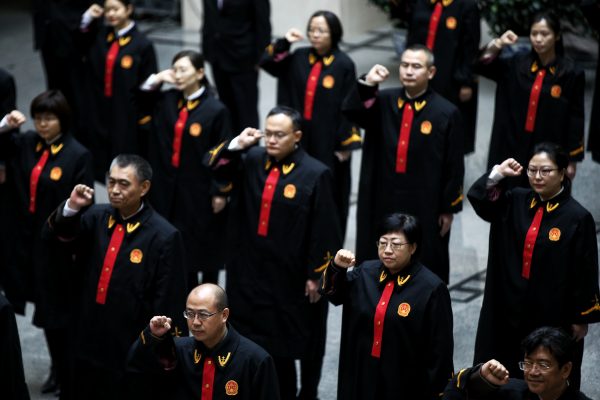Reforms included the relocation of authority over local court finance and personnel from local governments to the provincial level, introducing a personnel quota system to improve the calibre of judges, the emphasis of judges’ ‘lifetime accountability’ (zhongshen fuze zhi) for their judicial decisions and the specification of case transfer procedures between courts. Circuit courts, specialised tribunals and an online database of judicial decisions were created to improve judicial transparency.
Driven by Chinese President Xi Jinping’s political agenda, the top priority in implementing these reforms was not to enhance judicial autonomy, but to consolidate the power of the Chinese Communist Party (CCP) by asserting tight control over various aspects of Chinese society, including the legal system. It parallels waves of crackdowns on corrupt public officials, activist lawyers and organised crime throughout the 2010s. More recently, a sweeping rectification campaign against judicial corruption and other disciplinary violations is rippling through Chinese courts and other political-legal institutions.
China’s judicial reforms have only achieved limited results in enhancing judicial autonomy. Although reforming court personnel successfully centralised the authority to appoint frontline judges, local Party officials and the CCP’s Organisation Department retain considerable influence over the appointment of court presidents and vice-presidents.
The financial reforms remain incomplete as many courts still heavily rely on the support of local governments for their daily operation and judges’ compensation. Although the local dependence on courts in some less-developed areas has been alleviated, most courts still need the financial support of local governments in securing infrastructure and support staff.
Reforms to judicial accountability enhanced judges autonomy, enabling frontline judges to decide most cases without obtaining approval from court leaders or the adjudication committee. The reform provided some protection to frontline judges from external influences. Still, the new system of ‘lifetime accountability’ made Chinese judges more cautious in making risky or controversial decisions for the sake of self-protection. Various informal channels persist for local governments and other external actors to influence judicial decisions, especially in cases with high political or economic stakes. Judicial corruption remains a rampant problem.
The limited efficacy of judicial reforms is ultimately a result of the enduring ideological foundation of the Chinese legal system, which is characterised by Party control and maintaining order. This is best illustrated by Xi’s recent political-legal rectification campaign under which all judges must receive political education and risk losing their jobs if accused of being disloyal and dishonest to the Party. The authoritarian nature of Chinese courts has changed little under Xi. Instead, tighter Party control has led to a more weaponised judiciary aimed at maintaining social order and strengthening the rule of the Party-state.
In less political civil and commercial cases, the quality of judicial decision-making has improved thanks to the professionalisation of judges and the legal system’s continuous institutional building, which are long-term reform efforts that began before Xi took power.
In the realm of criminal law, such quality improvement has not taken place at a similar pace, as the institutional relations among the so-called ‘iron triangle’ — the police, the procuracy, and the court — have not changed. Judges cannot effectively check the misconduct of police officers and procurators.
The quality of judging varies significantly among different regions. Courts in more developed cities and regions recruit judges with superior training and credentials and enjoy strong financial and administrative support from local governments. These are luxuries that courts in less developed areas cannot afford.
Even judges in the most affluent areas of China face a daunting challenge: the skyrocketing caseload driven by rising economic and social activities. This poses a heavy burden on frontline judges and overtime work is commonly observed in lower-level courts. As a result, thousands of Chinese judges have resigned in the past decade to pursue other careers.
The attrition of mid-career judges is a particularly serious problem for many courts as these judges are in their prime years of frontline judicial experience but often face barriers in the bureaucratic hierarchy of Chinese courts. Xi’s recent rectification campaign of the political-legal system may accelerate this trend.
All of these developments in Chinese courts are ironic considering the proclaimed intention of China’s judicial reforms under Xi Jinping. Many political agendas and institutional changes have been imposed upon the judiciary, yet none of them has significantly changed the way courts operate in the political-legal system or improved the work and living conditions of judges. Some less noticeable improvements, such as the increasingly high standard of personnel recruitment and professional training, are making a larger impact on judicial behaviour and judges’ pursuit of justice in individual cases.
Chinese courts may never break away from the shackle of Party control, but more focus on the everyday work of professionalised judges, instead of top-down political agendas, would certainly make them more competent judicial institutions.
Sitao Li is a PhD candidate in sociology at the University of Toronto.
Sida Liu is Associate Professor of Sociology and Law at the University of Toronto.

